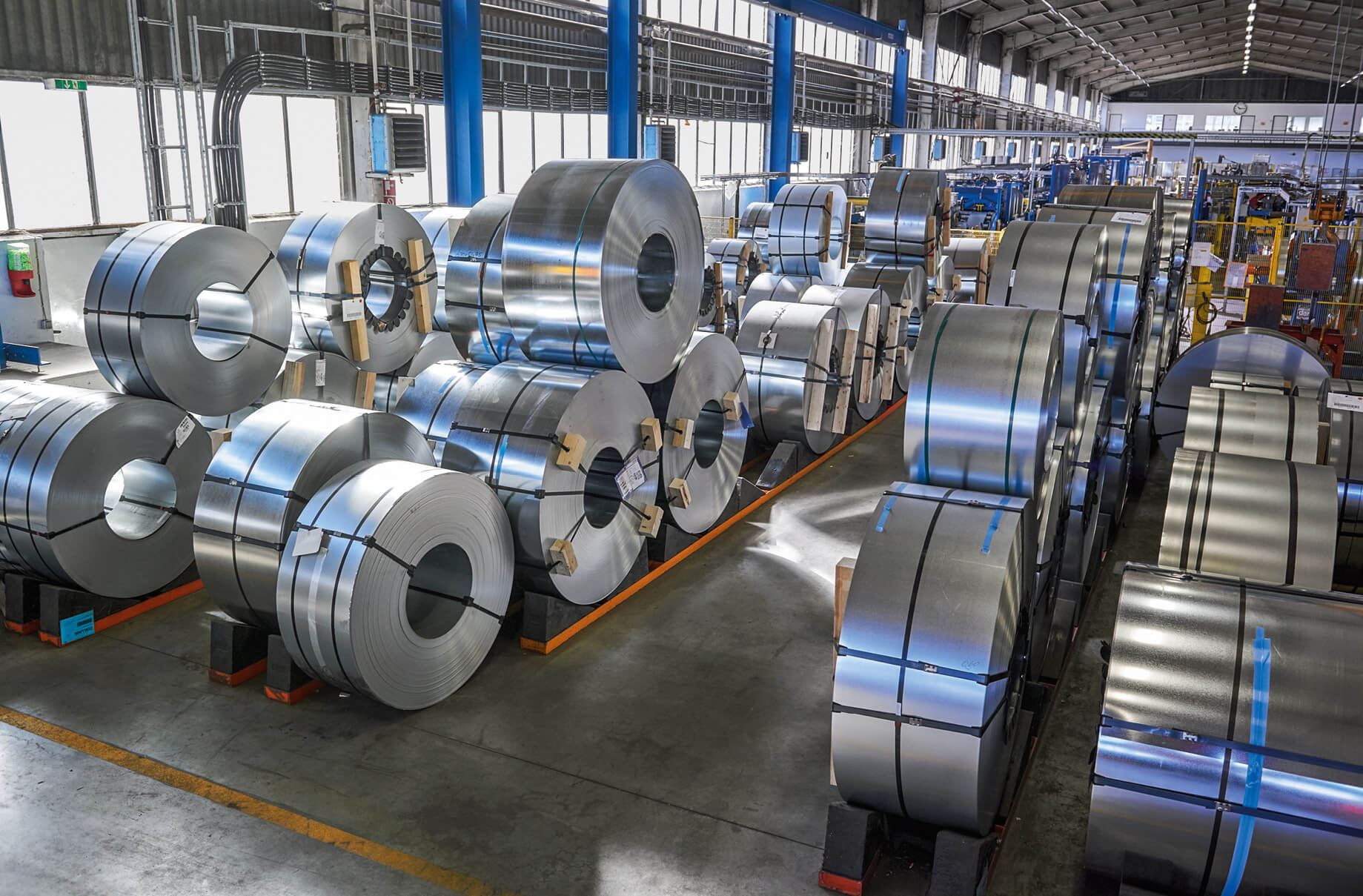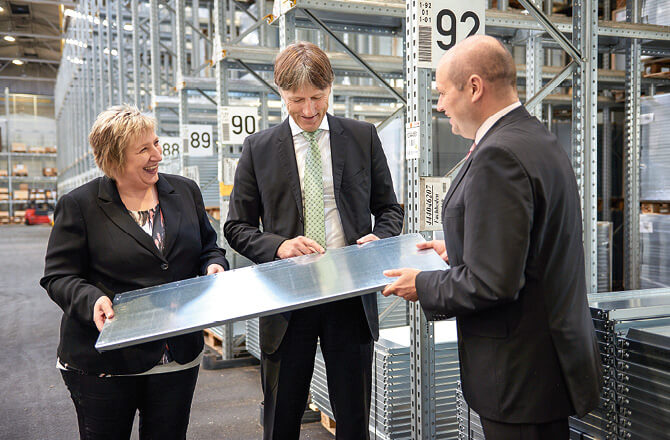Text Meinolf Droege ––– Photography
Whether it’s a huge roll of newsprint, pipette tips for medical technology, a car’s new front windscreen or a roll of fabric for the next fashion collection – fast and efficient turnaround of goods is essential for economic success in almost all sectors. Equally important for high-performance in-house material flow and trade are the customised shelving systems to meet a company’s individual needs. This is precisely what Dexion, part of the international Constructor Group, produces in a wide range of permutations using highly automated systems at its headquarters at Laubach in Hesse and other sites. The focus is on shelving for pallet racks, high-load mobile racks and floor racks for different sectors. However different the finished products might look, the key material for the almost inevitably customised warehouse and operating facilities is always steel. It produces lean, space-saving and yet highly resilient designs.
“Our customers are heavily involved in logistics. This makes a smooth supply chain and high availability crucial to their success, something all their market partners have to reflect. This is why we demand the same from our suppliers in the steel industry,” says Gerhard Schwager, COO of the Constructor Group. Evi Engert, Head of Supply Management, adds an impressive statistic: “However, steel is not simply steel. We currently have around 280 steel items actively listed to cover a wide variety of the dimensions and qualities required, of which almost half are fast movers.” And this although Dexion now almost exclusively processes strip material and only processes sheets and blanks for niche products.
Thus the movers and shakers at Dexion place weighty demands on their steel supplier of choice. Despite the difficult procurement situation on the steel market right now, often short order lead times and fluctuating margins mean Dexion requires a reliable supply of all qualities. Many products also call for processing more unusual thicknesses of steel. It was Stahlo’s persistent high standards and ability to deliver all the required dimensions and qualities quickly that prompted Dexion to choose this supplier as its partner. The expanded anti-dumping measures introduced by European governments in 2016 are one of the main factors that have caused a massive supply problem. Since the tougher penalty duties could also be applied retrospectively to goods already imported, many suppliers held back with their steel imports. The European steel manufacturers’ delivery times now stretch beyond 30 weeks with not entirely clear pricing.
“Despite all this, our global procurement structure, extensive in-house stocks and highly customised logistics concepts meant we already managed to deliver almost all of the ordered dimensions quickly during the first few months of our collaboration from mid-2016 onwards,” explains Stahlo’s Managing Director, Guido Spenrath. He is confident they will be able to fulfil almost 100 per cent of orders by further optimising the logistics between Dexion and Stahlo, despite the considerable challenges they face. “We started with small deliveries, then booked 2,500 metric tons of steel during the first quarter of this year.” And this is increasingly generating further business with Dexion’s sister company in Romania, too.
Rolled into shape
Multiple reshapings with tolerances of less than one tenth of a millimetre result in complex profiles, which become the supporting components of various shelving systems. Throughout three shifts, the shiny metal sheets pass directly from the multi-ton coil through different roll-forming systems with integrated test equipment. Dexion’s manufacturing centrepiece produces some very intricate-looking yet extremely stable geometric shapes that, when set in the appropriate frames, form the spine of any shelving system. It is hard to believe that such a rigid profile with different sections and dimensions, measuring up to 16 metres long, can be formed simply by precise shaping of relatively soft sheets. If customers want, they can be made even longer – after all, flexibility is a powerful argument to beat off the competition. Having been cut precisely to length, some of these profiles are immediately transferred to a welding line, where they are automatically joined together with support brackets to form beams and other components under the watchful eye of skilled welders. On the neighbouring production line, another fully automated process produces precisely folded-to-size shelves including all the attachment points in various sizes and with different load capacities. Customers are supplied with a giant jigsaw made up of these and many other components, which is then quickly and accurately slotted and screwed together on site.
Above all, the different requirements for shelf loads and compartment widths and depths affect the dimensions required for the supporting components. “Although we sell standard products, the dimensions are often highly customised,” Schwager says about day-to-day business. A company that stores only DIN-shaped pallets with heavy goods requires different shelf sizes from a plastics processor that handles very large but lightweight bumpers in its warehouse. And if space is tight in the warehouse, the only way is up! To offer competitive solutions in all sectors, Dexion can also supply higher-strength steel and intermediate thicknesses such as 2.25 and 2.75 millimetres, which are not stocked by all steel suppliers. This is where Stahlo has always stood out: “Besides non-standard dimensions, minimum tensile strengths – but above all special yield-to-tensile ratios and also the good weldability of our consistently zinc-plated quality products – play an important role,” Guido Spenrath reports.
Ongoing co-development
Dexion has spotted potential to optimise activities in this area. Schwager wants to discuss even more intensively with his designers and materials partner Stahlo how new kinds of steel can be used cost-effectively. The companies’ proximity to one another is not the only factor that helps. Both also consider themselves SMEs and work in straightforward organisational structures. And both are interested in long-term collaboration, as Schwager, Engert and Spenrath all agree. This ensures a relaxed atmosphere, even where they have different interests. “Our discussions have already revealed several new pieces to the puzzle that we will work on together to shape the whole picture,” Schwager reveals. Standardisations of dimensions that might make good sense and optimising logistics between the steel manufacturer and roll-forming system have been two interesting topics during their face-to-face talks.
As Dexion only stocks material in its own store to last three, maybe four, weeks on average, reliable delivery of the raw material is always a key issue – at competitive prices, of course. In the past few years, Stahlo has secured some very good procurement options based on a wide range of sources. Stahlo’s purchasers regularly travel to different countries. They already visited China and Korea, which are not affected by the anti-dumping measures, some years ago. And they recently scouted for new sources in Brazil and Mexico. “We purchase worldwide and can secure material. We supply the right solutions, which we implement hand-in-hand with our customers,” Spenrath reveals about their purchasing strategy. Thanks to our multi-sourcing and own stocks, Stahlo can generally even find a quick solution for urgent needs resulting from other suppliers’ shortages or for special kinds of steel.
Planning and constructing storage facilities are not the kind of things companies do every day. Nonetheless, customers also order specially configured systems from Dexion with noticeably decreasing delivery times. The company accommodates this and consistently adapts its own procurement and production logistics accordingly. Stahlo is a partner that will continue to keep a handle on costs and deadlines in future – to ensure that the Amazons, IKEAs and the local DIY stores of this world never run out of space to store all their stock.�


